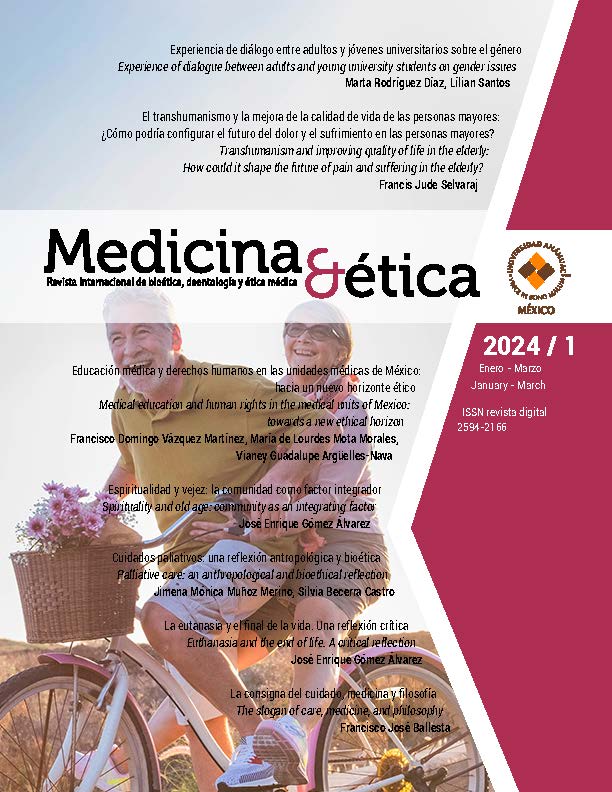Experiencia de diálogo entre adultos y jóvenes universitarios sobre el género
Contenido principal del artículo
Resumen
La diferencia generacional afecta la relación alumnos-profesores universitarios y tiene consecuencias en el aprendizaje. Para promover la apertura al diálogo de esos grupos sobre temas conflictivos, se desarrollaron una serie de talleres para una experiencia de diálogo sobre la cuestión del género. El enfoque fue multidisciplinar incluyendo elementos de filosofía, sociología, comunicación y bioética. Las líneas teóricas de abordaje fueron los “extraños morales” (moral strangers) de Engelhardt, un paralelo con el diálogo intercultural, y la comunicación a nivel de los valores en juego. Este artículo recoge la metodología de los dos días de talleres impartidos en una universidad de México. Los participantes fueron 50 jóvenes (entre 18 y 25 años) y 50 adultos. Se llevaron a cabo 4 talleres y 2 encuestas, intercalados por 3 conferencias. El artículo presenta cada actividad con el correspondiente objetivo de aprendizaje y los resultados. En la conclusión, se ofrecen algunas lecciones sobre el diálogo intergeneracional y sobre el diálogo sobre la cuestión del género.
Descargas
PLUMX Metrics
Detalles del artículo

Esta obra está bajo una licencia internacional Creative Commons Atribución-NoComercial-CompartirIgual 4.0.
Medicina y Ética se distribuye bajo Licencia Creative Commons Atribución-NoComercial-CompartirIgual 4.0 Internacional.
El autor conserva los derechos patrimoniales sin restricciones y garantiza a la revista el derecho de ser la primera publicación del trabajo. El autor es libre de depositar la versión publicada en cualquier otro medio, como un repositorio institucional o en su propio sitio web.
Citas
Engelhardt HT. The Foundations of Bioethics. New York: Oxford University Press; 1996. DOI: https://doi.org/10.1093/oso/9780195057362.001.0001
Harteveld E, Berntzen L, Kokkonen A, Kelsall H, Linde J, Dahlberg S. The (Alleged) Consequences of Affective Polarization: Individual-Level Evidence & a Survey Experiment in 9 Countries [Internet]. 2022 [citado 28 de diciembre 2022]. Disponibile en: https://osf.io/64uwd/ DOI: https://doi.org/10.31219/osf.io/64uwd
Jost J, Baldassarri D, Druckman J. Cognitive-motivational mechanisms of political polarization in social-communicative contexts. Nat Rev Psychol [Internet]. 2022 [citado 28 de diciembre de 2022]; Disponibile en: https://www.nature.com/articles/s44159-022-00093-5
Nordbrandt M. Affective polarization in the digital age: testing the direction of the relationship between social media and users’ feelings for out-group parties. NewMedia & Society [Internet]. 2021 [citado 28 de diciembre de 2022]. Disponibile en: https://doi.org/10.1177/14614448211044393 DOI: https://doi.org/10.1177/14614448211044393
Jones-Jang S, Chung M. Can we blame social media for polarization? Counter-evidence against filter bubble claims during the COVID-19 pandemic. New Media & Society [Internet]. 2022 [citado 28 de diciembre de 2022]. Disponibile en: https://doi.org/10.1177/14614448221099591 DOI: https://doi.org/10.1177/14614448221099591
Austriaco NPG. Biomedicine and Beatitude: An Introduction to Catholic Bioethics. 2a ed. Washington, D.C.: The Catholic University of America Press; 2021. DOI: https://doi.org/10.2307/j.ctv1tfw0p2
Deardorff D. Manual for developing intercultural competencies: story circles [Internet]. Paris: UNESCO Publishing; 2020 [citado 22 de abril de 2023]. Disponibile en: https://unesdoc.unesco.org/ark:/48223/pf0000370336
Fletcher S. Intergenerational Dialogue to Reduce Prejudice. Journal of Intergenerational Relationships [Internet]. 2007 [citado 22 de abril de 2023]; Disponibile en: https://doi.org/10.1300/J194v05n01_02 DOI: https://doi.org/10.1300/J194v05n01_02
UNESCO. UNESCO survey on intercultural dialogue, 2017: analysis of findings [Internet]. Paris: UNESCO Publishing; 2018 [citado 22 de abril de 2023]. Disponibile en: https://unesdoc.unesco.org/ark:/48223/pf0000262674
Rodríguez M. Teoría de género: presupuestos y raíces filosóficas. Rome: G&B Press; 2022. http://127.0.0.1:80/pug/resource?uri=453943BIB

